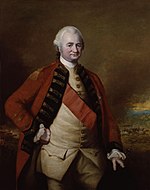Robert Clive, Date of Birth, Place of Birth, Date of Death
TweetRobert Clive
British East India Company military officer
 Date of Birth: 25-Sep-1725
Date of Birth: 25-Sep-1725
 Place of Birth: Shropshire, England, United Kingdom
Place of Birth: Shropshire, England, United Kingdom
Date of Death: 22-Nov-1774
Profession: politician, military officer
Zodiac Sign: Libra 
About Robert Clive
- Robert Clive, 1st Baron Clive, (29 September 1725 – 22 November 1774), was the first British Governor of the Bengal Presidency.
- He began as a British military officer and East India Company (EIC) official who established the military and political supremacy of the EIC by seizing control of Bengal and eventually the whole of the Indian subcontinent and Myanmar.
- He is credited with seizing control of a large swathe of South Asia (now Bangladesh, Bhutan, India, Maldives, Myanmar, Nepal, Pakistan and Sri Lanka) and parts of Southeast Asia and the wealth that followed, for the Company, in the process turning himself into a multi-millionaire.
- Together with Warren Hastings he was one of the key early figures setting in motion what would later become British India.
- Blocking impending French mastery of India, and eventual British expulsion from the continent, Clive improvised a military expedition that ultimately enabled the EIC to adopt the French strategy of indirect rule via puppet government.
- Hired by the EIC to return a second time to India, Clive conspired to secure the Company's trade interests by overthrowing the Ruler of Bengal, the richest state in India.
- Back in England, he used his loot from India to secure an Irish barony from the then Whig PM, Thomas Pelham-Holles, 1st Duke of Newcastle, and a seat for himself in Parliament, via Henry Herbert, 1st Earl of Powis, representing the Whigs in Shrewsbury, Shropshire (1761–1774), as he had previously in Mitchell, Cornwall (1754–1755).Clive was one of the most controversial figures in all British military history.
- His achievements included establishing control over much of India, and laying the foundation of the entire British Raj, though he worked only as an agent of the East India Company, not the British government.
- For his methods and his self-aggrandisement he was vilified by his contemporaries in Britain, and put on trial before Parliament.
- Of special concern was that he amassed a personal fortune in India.
- Modern historians have criticised him for atrocities, for high taxes, and for the forced cultivation of crops which exacerbated famines.
Read more at Wikipedia
See Also
- Famous People's Birthdays on 25 September, United Kingdom
- Famous People's Birthdays in September, United Kingdom
- Famous politician's Birthdays on 25 September, United Kingdom
- Famous politician's Birthdays in September, United Kingdom
- Famous military officer's Birthdays on 25 September, United Kingdom
- Famous military officer's Birthdays in September, United Kingdom


